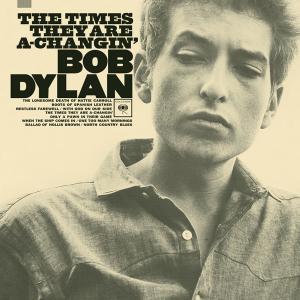
The Times They Are A-Changin' (1964)

1. The Times They Are A-Changin'
2. Ballad of Hollis Brown
3. With God on our Side
4. One Too Many Mornings
5. North Country Blues
6. Only a Pawn in Their Game
7. Boots of Spanish Leather
8. When the Ship Comes In
9. The Lonesome Death of Hattie Carroll
10.Restless Farewell
Released in the immediate aftermath of one of the most traumatic moments in modern American history—the assassination of President John F. Kennedy—Bob Dylan’s The Times They Are A-Changin’ stands not merely as an album, but as a weathered monument to a nation’s moral reckoning. This was Dylan’s third LP, and though it followed in the sonic footsteps of his earlier folk outings, its tone, thematic focus, and lyrical sharpness set it entirely apart. Gone was the wistful ambiguity of Freewheelin’. In its place: a document of protest, unflinching in its purpose and bitter in its delivery.
It is perhaps Dylan’s most austere and unforgiving work. The palette is minimal—acoustic guitar, voice, and harmonica—but the effect is volcanic. In an era long before punk, hip hop, or metal offered mass-market avenues for discontent, Dylan’s stripped-down fury provided a singular outlet. Songs such as Only a Pawn in Their Game and With God on Our Side deliver their indictments with devastating restraint.
The former, a scathing commentary on systemic racism, avoids easy villainy and instead deconstructs the machinery of American injustice. The latter interrogates nationalism with a theological edge rarely attempted in popular music, let alone executed with such bitter eloquence.
Not content to stop at war and race, Dylan surveys poverty (Ballad of Hollis Brown), class (North Country Blues), and gender injustice (The Lonesome Death of Hattie Carroll) with a precision more journalistic than lyrical. If folk music was once a vehicle for communal storytelling, Dylan turns it into a courtroom—he is witness, prosecutor, and poet all in one. The title track, often misinterpreted as a generational anthem of hope, reads more accurately as a stern summons to conscience. It is a call not merely for change, but for accountability.
There is little relief here. Where his prior records occasionally flirted with humor or romantic wistfulness, The Times They Are A-Changin’ offers little in the way of levity. Even its optimism, as glimpsed in the title song, is edged with grim inevitability. The emotional experience is stark—at times draining. But this was the price of clarity in a confused and wounded America.
Vocally, Dylan was never a traditionalist’s delight, and this album finds his delivery more raw and confrontational than ever. The simplicity of the arrangements only magnifies the intensity of the words, and by the end of the record, there is no mistaking the intent: Dylan had ceased to merely report the times—he was shaping them.
In retrospect, The Times They Are A-Changin’ is not just a folk record, nor even just a protest album—it is the distilled voice of conscience in a country that had, in many ways, lost its bearings. That it remains uncomfortable to hear even now is a testament to its enduring power.
Go back to the main page
Go To Next Review